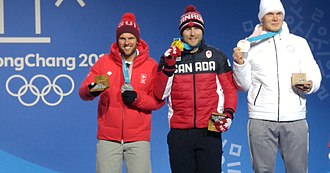2018 Winter Olympics medal table
| Part of a series on |
| 2018 Winter Olympics |
|---|
The 2018 Winter Olympics, officially known as the XXIII Olympic Winter Games, were an international winter multi-sport event held in Pyeongchang County (stylized as PyeongChang for the games), South Korea, from 9 to 25 February, with preliminary events in some sports beginning on 8 February. A total of 2,833 athletes representing 92 National Olympic Committees (NOCs) participated. The games featured 102 events in 15 sports, making it the first Winter Olympics to surpass 100 medal events. Four new disciplines in existing sports were introduced to the Winter Olympic Games program in Pyeongchang: big air snowboarding, mixed doubles curling, mass start speed skating, and mixed team alpine skiing.
Athletes representing 30 NOCs received at least one medal, the highest for any Winter Olympic Games thus far, with 22 NOCs winning at least one gold medal. Athletes from Norway won the most medals overall, with 39, surpassing the previous record of 37 medals set by the United States at the 2010 Winter Olympics. Athletes from Germany and Norway tied for the most gold medals with 14 each, equaling the record set by Canada in 2010 for most gold medals won at a single Winter Olympics. Hungary won its first Winter Olympic gold medal ever, doing so in the men's 5,000 meter short-track speed skating relay.
Norwegian cross-country skier Marit Bjørgen won the most medals at the games with five (two gold, one silver, and two bronze). With 15 total Olympic medals, she also became the most decorated athlete in Winter Olympics history.
Medal table

Legend:
represents countries that won at least one gold medal.
represents countries that won at least one silver medal but no gold medals.
represents countries that won at least one bronze medal but no gold or silver medals.
represents countries that did not win any medals.
represents entities that did not participate in the 2018 Winter Olympics.

The medal table is based on information provided by the International Olympic Committee (IOC) and is consistent with IOC conventional sorting in its published medal tables. The table uses the Olympic medal table sorting method. By default, the table is ordered by the number of gold medals the athletes from a nation have won, where a nation is an entity represented by a NOC. The number of silver medals is taken into consideration next and then the number of bronze medals. If teams are still tied, equal ranking is given and they are listed alphabetically by their IOC country code.
At the 2018 Winter Olympics, athletes were tied in three events. In the women's 10 km cross-country skiing, two bronze medals were awarded due to a tie. In the two-man bobsleigh, two gold medals and no silver medal were awarded due to a tie, while in the four-man bobsleigh, two silver medals and no bronze medal were awarded due to a tie.
* Host nation (South Korea)
Changes in medal standings
See also
- List of 2018 Winter Olympics medal winners
- All-time Olympic Games medal table
- 2018 Winter Paralympics medal table